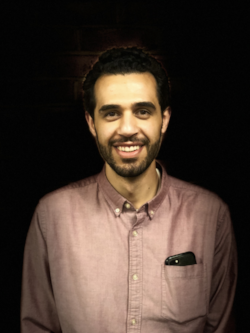Open Labs Spotlight: Sharif Kronemer
/Written by Susan Knox
Sharif Kronemer is a fourth year Ph.D. student in the Neuroscience Department at Yale University, as well as the Director of the Yale University branch of Open Labs. Sharif’s interest in science began in a high school philosophy class that focused on philosophy of mind. He recounts, “Philosophers of mind were really neuroscientists and psychologists before either formally existed as a field of study. These philosophers were trying to better understand how the mind worked and its relationship to the brain. I was fascinated by the questions these philosophers asked but I wanted to use a scientific approach towards answering these questions. This inspired me to pursue the study of consciousness in the framework neuroscience.” On that note, Sharif strives to identify key brain networks necessary for consciousness (Sharif explains consciousness or perception as “the state of being able to notice and potentially report on something [e.g., noticing a car driving by, or the feeling of pain or happiness]”). Both philosophers and scientists have been studying consciousness for hundreds of years. Sharif gets to actually work with community members who volunteer to participate in his studies. Participants complete computer tasks involving perception while Sharif records brain signals using various technologies such as fMRI and EEG. Results from his studies will clarify where and how consciousness works in the brain. Potential applications of these conclusions could be used to restore consciousness in patients (e.g., coma) or create an artificial consciousness.
Sharif genuinely loves being a Ph.D. student and reflects, “The most exhilarating part about being a scientist is studying a topic that is totally mysterious. In the case of my research, no one knows how consciousness works. Thinking that I could have a part in solving this puzzle is exhilarating! Of course, like most scientists, I love to learn and graduate school is an excellent way to learn something new every day.”
He had his first laboratory learning experience at the age of 19. He was bold and determined, emailing various researchers with whom he did not have any connections to find a summer placement. An investigator at Georgetown University offered him a position in the lab, where Sharif learned about antiepileptic drug effects on the developing brain. As the only research assistant in the lab that summer, he worked in the wet lab preparing chemicals and stains and was able to interact individually with Ph.D. students and postdocs. While this experience helped him understand that he did not want to work in a wet lab, he still learned valuable lessons about the scientific process. Every adventure will teach you something about yourself.
Sharif’s advice for younger students interested in the sciences and pursuing graduate school: “first, take your time figuring out what you want to do! You have many years and years to find what you like and do not like. I would say you should start formulating an idea of your primary interests by your mid-twenties. Many Ph.D. students these days will take several years off between undergrad and grad school. In most cases for science students, they will spend this time in a lab but I also know people who did something totally different during this time, for exampling, running a coffee shop in South America for two years before starting a Ph.D. in neuroscience. Second, there is more to learn than STEM! If you go to college and pursue a STEM major there are often strict constraints on the courses you will be required to complete leaving you little room for other subjects. Don’t forget that there are many other topics outside of the STEMS that can enrich your education and in some cases directly educate your science interests. Remember it was my philosophy class in high school that got me into neuroscience. Finally, find a mentor! A mentor can be anyone from a friend a year ahead of you to a senior scientist or professional who can help guide you and give you advise as you pursue your schooling and beyond. Make sure to discuss your goals with a teacher or counselor. They can offer invaluable assistance. I wish I did this more!”
As he is becoming more senior in his Ph.D. research, Sharif finds balancing his lab obligations with my passion for science outreach has become more challenging, but is still able to find time for both, “This requires setting aside most of my evenings for outreach, but because I love engaging in outreach, it rarely feels like work”. Attesting to his passion for outreach, Sharif is also a Graduate Affiliate at Pierson College at Yale and helps to organize events and mentor Yale undergrads on their research projects.
No doubt we will see Sharif doing great things after he completes his Ph.D. He is currently keeping his options open, but is fairly certain he will continue on the academic track by pursuing a post-doctoral position where he will be able to continue research and development of his knowledge of new research questions and techniques. “This additional experience will make me a more well-rounded scientist and prepare me for a professorship if I decide to pursue this track. But, having grown up outside of Washington D.C. and with two parents closely connected to the government, I have always been interested in politics and I have considered leaving academia for a career in science policy. I think I would also be very help in a science writing career. Whichever career I do end up pursuing, I know for me to be fulfilled it must involve elements of critical thinking, learning, leadership, and self-motivation.”
If you have any questions for Sharif, other members of the Open Labs team, or if you want more information on how to attend or get involved with upcoming events, contact us at openlabsfellowship@gmail.com. Also, be sure to follow us on Facebook, Twitter, and Instagram for the latest Open Labs and science updates!



